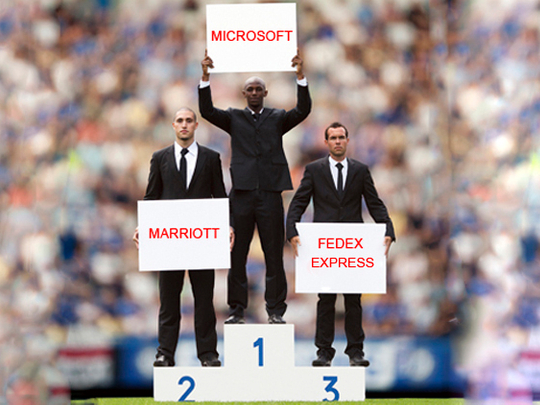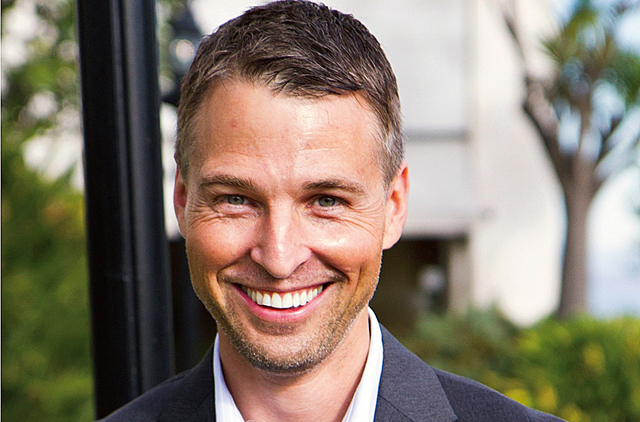
What do a furniture shop that encourages staff to build schools for those in need and a global hotel chain that gives its employees a certificate when they receive a thank-you note from a guest have in common? They are among the top 15 companies recognised as great places to work in the UAE. The list, prepared annually by Great Place to Work Institute UAE (GPTW UAE), was released last month in Dubai. The furniture company, The One, placed fourth while the Marriott group placed second in the list.
Analysing the winners’ list shows it’s simply not enough now for companies to think a good salary is the way to attract talent – or to make their company a great place to work. Tenth-placed EMC2, an information technology company, for example, grants paternity leave and wedding leave. It also grants public holidays in excess of government stipulation.
Encouraging staff to participate in corporate social responsibility (CSR) schemes is part of many companies’ HR plans and this is reaping huge dividends in making staff feel responsible and committed to the community and the company. “The CEO of The One, Thomas Lundgren, together with the head of HR came up with a really innovative concept of staff participation,’’ explains David Robert, partner and director of GPTW UAE.
The One staff members can volunteer to work on any of the company’s CSR projects such as building schools or making arrangements to provide drinking water to villages in India, Bangladesh and parts of Africa. “The One’s social initiatives give a sense of social engagement to the employees – they feel that their contribution helped build a school in Africa, which translates to more involvement with their work and better fulfilment,” David says.
“In exchange for that level of engagement, the company gives them some interesting incentives, which brings about a tremendous work-life balance. For instance, their employees can take their annual leave of 30 days in one chunk at any time they want without having to coordinate with their colleagues – something unique in the work environment in the region.’’
The global picture
Microsoft, which tops the list this year, was also voted Best Multinational Employer in the World 2012 by GPTW New York, for the huge range of healthcare benefits it offers its staff and their dependants. Unique among these is a benefit for autism therapy. The company also offers back-up care when regular child-care arrangements break down, assistance with tuition for staff’s children and if an employee volunteers for a charity, Microsoft will donate $17 per hour to their chosen cause.
Global cleaning products company SC Johnson – 24th on GTPW’s list of the 25 World’s Best Multinational Workplaces in 2012 – has on-site concierge staff offering discounted services to employees such as mailing packages, collecting groceries, sending flowers, researching car insurance, changing the oil in your car and even standing in line to get your concert tickets.
Speaking of going over and above expectations, TRC, a recruitment firm ranked as one of the top ten employers in Australia, recently rescued a staff member who had forgotten to buy his wife a Valentine’s Day gift. The company organised for a present to be bought, packed and sent to his spouse in the nick of time. The result? With that small gesture, which didn’t cost too much, the company generated a tremendous amount of goodwill among its staff.
As for other perks, there are few companies that can beat Netflix’s holiday policy. The US film-delivery company has unlimited vacation days for its 900 employees. Essentially, employees decide the number of days they take off – provided their work is done! This is an extension of Netflix’s policy of employees deciding the number of hours they work.
Netflix co-founder Reed Hastings says the company determines success by focusing on what their employees get done, not on how many days they’ve worked. So, for example, if you do a job in a week that would have normally taken a month, then you can treat yourself to a couple of weeks off.
Socialising, relationships and trust
We asked David what factors he thought made a great workplace. “A company that focuses on motivating its employees to emotionally connect them to their jobs. Such companies give opportunities to their employees to socialise and develop friendships at work and have a bit of fun.’’ Some companies such as Dulsco and General Electric, for instance, actively organise family fun days, workshops for staff to boost team play and leaderships skills, and encourage staff to sign up for talent-building programmes.
Another important factor is the relationship the company and the management has with its employees. “The main focus areas are as follows: Does the leadership consistently apply polices and programmes across the board? Does it give them an opportunity to make decisions and give them some amount of autonomy? Does it include them in decisions that directly impact them at the workplace?”
Trust is the keyword as far as GPTW is concerned. “It is an employee-retention strategy that works for all organisations,” says David. GPTW lists the example of the US-based QuikTrip, a GPTW winner, which has maintained one of the lowest turnover rates in its industry with practices that promote trust, excellence and caring. The company knows exactly what kind of employees it wants, and screens carefully for desired traits and talents.
While QuikTrip is flexible about the hours worked, it insists that service comes first. All employees are expected to deal with customers in a friendly manner. It pays all trainers a retention-based bonus, requires one-on-one employee-manager meetings every 60 days, creates the opportunity for managers to make healthy performance bonuses, creates a Monday-to-Friday-only shift and gives women who are primary caregivers an extra three days off every year.
But QuikTrip’s human resources vice-president, Kim Owen, says that the most important thing the company does is create a climate of trust. In fact, a massive 98 per cent of the company’s employees say they trust management because its policies are employee-friendly and the company trusts its employees 100 per cent.
How the UAE measures up
Says David: “Our more than 27 years of research show that in a great workplace, trust manifests itself in every relationship. A high degree of trust is what is common to all great workplaces. Employees cooperate and collaborate in such an environment, leading to positive interactions, higher profits and greater productivity.” During the three years GPTW has been functioning in the UAE, it has seen the trust level in local companies that they evaluated go up exponentially. While only ten companies made the list in 2012, there are 15 this year.
The GPTW analysts studied the scores of top companies on two parameters – the trust they inspired in their staff and management’s adherence to the company’s ideals. “We found that on both these counts the UAE is right up there ranking eighth globally. “From the employee perspective UAE compares very well with the rest of the world such as the US and parts of western Europe which has a much more mature HR market,” says David.
He adds that where companies in the UAE lag behind is in the culture perspective – the management’s views are very often not in sync with the company’s goals and ideals. And there is a reason for this – many companies in the region have very small HR departments that do not look upon themselves as a strategic arm of the organisation. “Leaders of such companies look at human resources from an operational and administrative perspective.’’
This means people strategies are decided by the leaders and HR is brought in only to facilitate the process. Instead, they should be made an integral part of the recruitment process so they choose the right kind of person for the job and ensure that the employee is in sync with the management’s vision of the company. “There are companies that adopt best practices, but clearly we don’t see it consistently across the board,’’ says David. “However, over the past few years we’ve seen that HR has been given a seat at the table to see how things can be improved…
We are seeing a culture where it’s not just technical or job-related skills that matter, but people-management skills as well. People who can interact with and guide their staff, who can get the most and the best out of them while also helping them grow are the ones who are getting promoted.”
What employees are looking for
What drives companies to apply for listing as a great workplace is the fact that competitive salary alone is no longer the only factor that lures talent. “Money is one way of upgrading your team but the reality is that people want to feel that they are more than just a sales figure on a white board. They want to feel valued,” says David. A global survey in 2012 by Success Factors, a SAP company, found that candidates negotiate for more and better benefits than they were originally offered, and that flexible work hours are most sought after.
And companies seem to be responding to such demands. For instance, Virgin Mobile Australia offers five unpaid days off to staff who have a new puppy or kitten. But the situation is more complex than this. “Great workplaces are developed over time,” says David. “They do not come into being overnight. And they have to maintain the practices that make them great. No existing ‘great’ workplace can afford to relax once it achieves its objectives.
Companies that experience high degrees of trust for a long time absolutely benefit from heightened levels of efficiency within their organisations, but they continue to remain focused on trying to understand their employees more deeply in an effort to continuously improve.” David adds, “The pride people feel at work is not just about the product and what they deliver but crucially, about what they represent.” In short, it takes more than just money to win employees’ loyalty.












